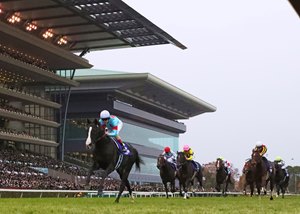Japan's Bonus Program Aims to Spur International Racing


A look at the past two editions of the Japan Cup (G1) suggests the updated bonus scheme put in place in 2020 is accomplishing its goals.
After the 2019 Japan Cup failed to attract a single international runner, the Japan Racing Association decided to consider a new approach to its purse structure. It settled on a lucrative bonus program that encourages local horses to venture overseas for top international races ahead of the Japan Cup while providing an motive for international runners to travel to the Far East to compete in the race.
The three international runners in this year's field Nov. 24 at Tokyo Racecourse will race for a purse that could be worth as much as ¥1.085 billion (US$7,004,000 million), with about half of that purse, $3 million if the race is won by an international starter, coming from the bonus program. Local runners are competing for a base purse of ¥500 million but they can be eligible for up to an additional $2 million through bonus-qualifying victories in selected international races.
"We developed the the bonus system over the years, but in 2019, unfortunately, there were no overseas runners in the Japan Cup," said Araki Ryusuke, a deputy manager in JRA's International Department. "That was a big moment for JRA to think about how to attract overseas trainers. That was a big event that made us feel like we needed to do something."
Under this new plan, Japan-based Equinox traveled out of Japan and dominated the 2023 Dubai Sheema Classic (G1T). With that victory under his belt, he secured the full Japan bonus when he won last year's Japan Cup by four lengths.
This year's $3 million winner's bonus for international runners has helped attract a strong trio of runners in Auguste Rodin , Goliath , and Fantastic Moon . Besides the $3 million bonus for victory, they're also eligible for a $1.2 million bonus for second and $750,000 for third.
For international runners, Japan Cup qualifying races that make runners eligible for the bonus are contested in seven countries. Auguste Rodin punched his ticket through a victory in the Prince of Wales's Stakes (G1), Goliath qualified through his win in the King George VI and Queen Elizabeth Stakes (G1), and Fantastic Moon became bonus-eligible by winning the Grosser Preis Von Baden (G1).
Qualifying races that were offered this year in the United States were all grade 1 stakes on the turf: the Manhattan, Arlington Million, Sword Dancer, Joe Hirsch Turf Classic, and Breeders' Cup Turf.
John Stewart's Resolute Racing is the majority owner of Goliath. The Lexington resident noted that besides the lucrative purse structure and bonus program, the Japan Cup offers terrific benefits for owners.
"I think it's awesome. I mean, we make $270,000 (in purse money) no matter how we do in the race, and they paid for everything," Stewart said. "One thing I will say about the JRA is that they have been very hospitable. Not only did they offer to pay for us to come over and our hotels, but they did that for even the minority owner (Baron Philip von Ullmann), for the trainer, for all the staff, for everybody."
Stewart loves international racing and would like to see more American trainers consider these options.
"The only way we can really test ourselves is to open up the competition and compete against each other," Stewart said. "Americans are terrible. I've got top trainers in America, and I had horses that I wanted to go to Royal Ascot. None of them would go, right? They won't go. They'll say, 'Well, the prize money is not what it should be.' I don't care about the prize money.
"What I have no interest in doing is taking a horse and winning a bunch of races one year and then just racing in the same races the next year, which seems to be what we do in America. When I have a horse that's been successful like that, I want to think about, 'OK, do we go to Australia? Do we go to Japan? Do we go to these other places and really test them.' "

In London to honor Equinox's recognition as the World's Best Racehorse in January, JRA president and CEO Masayoshi Yoshida said he would like to see more international runners in the Japan Cup.
"We would like to have more international racing in Japan—we would have liked to have seen them race against Equinox in Japan," Yoshida said. "We would like to see the best horses from around the world come compete with the best Japanese horses. We want more Japanese fans to watch the high level of racing that international runners bring."
With the bonus program in place, it appears Japan is making progress on that goal.
